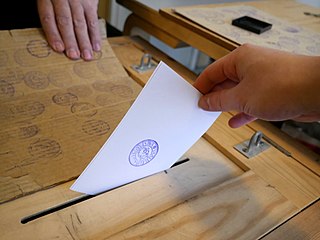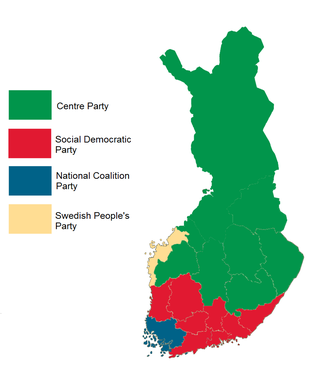The Swedish People's Party of Finland is a Finnish political party founded in 1906. Its primary aim is to represent the interests of the minority Swedish-speaking population of Finland. The party is currently a participant in the Government of Petteri Orpo, holding the posts of Minister of Education, Minister for European Affairs, and Minister of Youth, Sport and Physical Activity.
The National Coalition Party is a liberal-conservative political party in Finland. It is currently the biggest party and the ruling political party of Finland.

The Centre Party, officially the Centre Party of Finland, is an agrarian-centrist political party in Finland. Ideologically, the Centre Party is positioned in the centre of the political spectrum. It has been described as liberal, social-liberal, liberal-conservative, and conservative-liberal. The party’s leader is Antti Kaikkonen, who was elected in June 2024 to succeed former minister Annika Saarikko. As of June 2023, the party has been part of the parliamentary opposition.

The Finns Party, formerly known as the True Finns, is a right-wing populist political party in Finland. It was founded in 1995 following the dissolution of the Finnish Rural Party.

There are four types of elections in Finland. Each Finnish citizen at least 18 years of age has the right to vote in each of the elections, which decide the following: the president, the parliament, the MEPs, and the municipal and city councils.

Parliamentary elections were held in Finland on 16 March 2003. The Centre Party led by Anneli Jäätteenmäki overtook the Social Democratic Party (SDP) to become the largest party in the Eduskunta. This was credited mainly to Jäätteenmäki's powerful leadership and modernization of the party still often viewed as agrarian and conservative by many. However, the SDP actually won some seats and increased its share of the vote, losing in the number of total popular votes only by a few thousand.

Parliamentary elections were held in Finland on 18 March 2007. Early voting was possible from the 7–13 March. The 200 members of the Eduskunta were elected from 15 constituencies.

Parliamentary elections were held in Croatia on 25 November 2007 and for overseas voters on 24 and 25 November. The campaign officially started on 3 November. The President of Croatia announced elections on 17 October and 14 days were allowed for candidate lists to be submitted.
The 1996 European Parliament election in Finland was the first election of the Finnish delegation to the European Parliament.

Mitro Repo is a Finnish Orthodox Christian priest. He was member of the European Parliament from 2009 until 2014, elected as an independent candidate on the Social Democratic Party's ticket. He ran also in the 2014 election but received less than 9,000 votes compared to over 70,000 in the 2009 election, and was not re-elected.

Parliamentary elections were held in Finland on 17 April 2011 after the termination of the previous parliamentary term. Advance voting, which included voting by Finnish expatriates, was held between 6 and 12 April with a turnout of 31.2%.

Presidential elections were held in Finland in January and February 2012. The first round took place on 22 January 2012 with advance voting between 11 and 17 January. Since no candidate received a majority of the vote, a second round was held on 5 February, with advance voting between 25 and 31 January. Sauli Niinistö was elected the President of Finland for a term from 1 March 2012 until 1 March 2018.

The Social Democratic Party of Finland is a social democratic political party in Finland. It is the third largest party in the Parliament of Finland with 43 seats. Founded in 1899 as the Workers' Party of Finland, the SDP is Finland's oldest active political party and has a close relationship with the Central Organisation of Finnish Trade Unions. It is also a member of the Party of European Socialists, Progressive Alliance, Socialist International and SAMAK.

An election for the election of the delegation from Finland to the European Parliament took place on 25 May 2014 with advance voting from 14 to 20 May. Finnish voters elected thirteen members to the European Parliament.
Following the 2011 election, a new government was negotiated between the leading parties of the Finnish parliament.

Juhana Mikael Vartiainen is a Finnish politician, economist and a member of the Finnish Parliament, representing the National Coalition Party, which he joined after having been a member of the Social Democratic Party of Finland from 1975 to 2015. He was elected the Mayor of Helsinki in August 2021 by the Helsinki city council.

Parliamentary elections were held in Finland on 14 April 2019. For the first time, no party received more than 20% of the vote. The Centre Party, which had been the largest party following the 2015 elections, dropped to fourth place, losing 18 seats and recording its lowest vote share since 1917. The Social Democratic Party saw the biggest gains, winning six more seats and narrowly becoming the largest party for the first time since 1999. The Green League and the Left Alliance also gained five and four seats respectively.

Pasokification is the decline of centre-left, social-democratic political parties in European and other Western countries during the 2010s, often accompanied by the rise of nationalist, left-wing and right-wing populist alternatives. In Europe, the share of votes for centre-left parties was at its 70-year lowest in 2015.

Parliamentary elections were held in Finland on 2 April 2023 to elect members of the Parliament of Finland.














